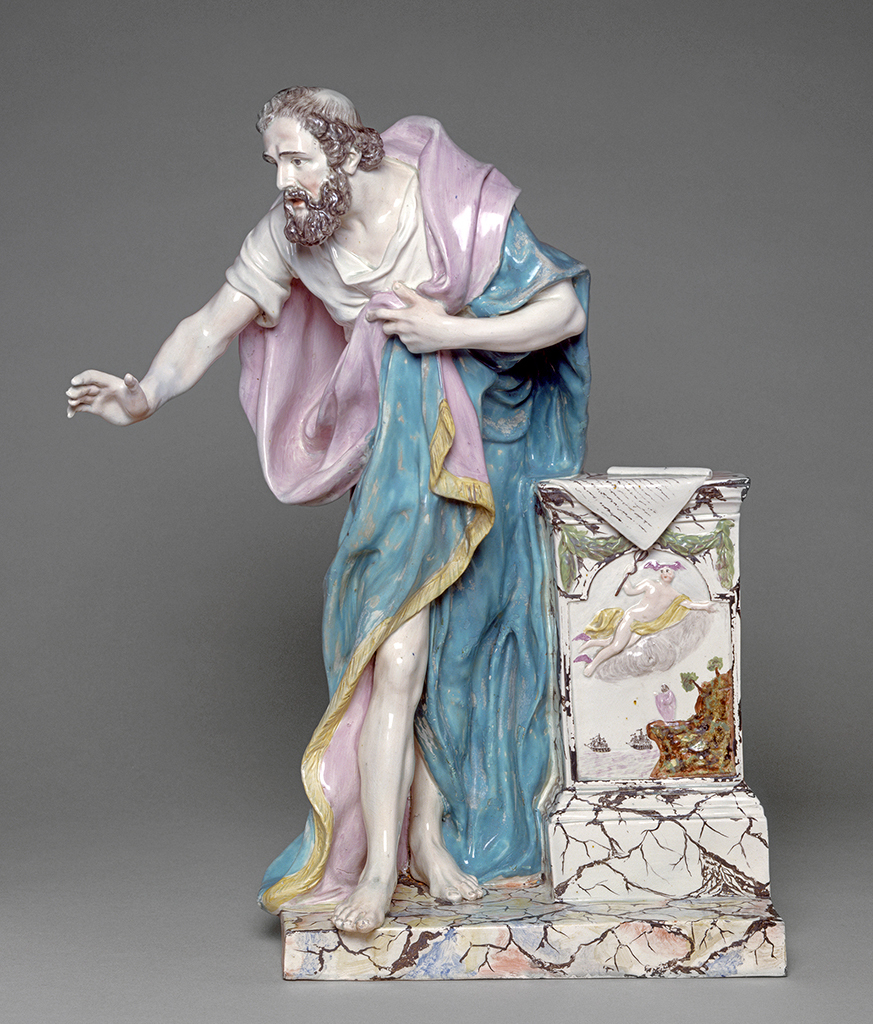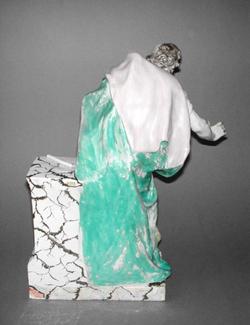Current Location: In storage
Titles
Demosthenes (384-322 BC)
Maker(s)
Potter:
Wood, Enoch
Sculptor:
Cheere, John
(After)
Entities
Categories
Description
Earthenware with blue-tinted lead-glaze, painted in polychrome enamels
Earthenware, press-moulded, covered with blue-tinted lead-glaze, and painted in blue, turquoise, pale yellow, flesh pink, pale pink, red, brown, grey, and black enamels. The shallow, straight-sided rectangular base is hollow underneath, and is painted in blue, pale red, brown, grey and black to resemble marble. Demosthenes stands on his left leg with his right advanced. He leans forward, extending his right arm and holding up his cloak up to his chest with his left hand. He has black hair and beard, and wears a white tunic and a long turquoise cloak with a pink lining and yellow fringe. On the viewer's right there is a tall pedestal veined in black to resemble marble, and decorated on the front in relief with a green swag above an arched panel enclosing a scene showing a small figure of Demosthenes standing on a rocky promontory addressing the waves, with two sailing ships in the distance, and overhead, a larger figure of Hermes/Mercury holding a caduceus with a cloud below him.
Notes
History note: Christie, Manson & Woods, London, 12 December 1918, Porcelain, decorative furniture and Eastern rugs, lot 37; purchased for 37 guineas by Mr Stoner who sold it on the same day for £38 to Dr J.W.L. Glaisher, Trinity College, Cambridge
Legal notes
Dr J.W.L. Glaisher Bequest
Measurements and weight
Height: 48.2 cm
Acquisition and important dates
Method of acquisition: Bequeathed
(1928-12-07)
by
Glaisher, J. W. L., Dr
Dating
18th Century, Late
George III
Circa
1784
CE
-
1793
CE
Note
The figure in relief on the pestal is Hermes/Mercury, the messenger of the gods, who was associated with eloquence and reasoning, and therefore alludes to Demosthenes' oratorial skill.
The mark E. WOOD suggests that the figure was probably made between 1783 when Enoch Wood (1739-1840) was potting on his own, probably at the Over House Works in Burslem, and 1793 when he opened a new factory at Fountain Place, and entered into a formal partnership with James Caldwell which lasted until 1818. However, it is possible that the mark E. WOOD continued to be used after the partnership was formed and the WOOD & CALDWELL mark was introduced. Wood's partnership with his cousin Ralph Wood in 1784 lasted for only a few weeks.
When purchased by Dr Glaisher the figure was identified as St Paul preaching at Athens, and has also been described as 'Eloquence', but the model was after a plaster of Demosthenes by John Cheere (1709-87) of which there is an example 20 in high at Burton Constable, Yorkshire, where there is also a preliminary drawing by Cheere, and a life-size figure neither of which have the pedestal on the right of the figure (see Documentation, Hall, 1970). If not from Cheere, Wood might have obtained a plaster model from Charles Harris of the Strand (d. c. 1795) whose undated 'Catalogue of Statues, Bass Reliefs, Bustos, & c.' (V. & A., National Art Library 1.37.Y) includes a figure of Demosthenes of the same size for 2 guineas, and figures of Prudence and Fortitude which might have been the models for Wood's figures of those subjects. A somewhat similar figure is shown representing 'Education' in George Bickham's 'The Universal Penman', London, 1743.
School or Style
Baroque
People, subjects and objects depicted
Components of the work
Decoration
composed of
enamels
( blue, turquoise, pale yellow, flesh pink, pale pink, red, brown, grey, and black)
Materials used in production
tinted slight blue
Lead-glaze
Earthenware
Techniques used in production
Press-moulding
: Earthenware, press-moulded in parts, covered with blue-tinted lead-glaze, and painted in blue, turquoise, pale yellow, flesh pink, pale pink, red, brown, grey, and black enamels
Lead-glazing
Inscription or legends present
- Text: E. WOOD
- Location: On back of base
- Method of creation: Impressed
- Type: Factory mark
References and bibliographic entries
-
Catalogue of the Glaisher Collection of Pottery and Porcelain in the Fitzwilliam Museum Cambridge
page(s): 118
-
English Ceramics 1580-1830, A Commemorative Catalogue to Celebrate the 50th Anniversary of the English Ceramic Circle 1927-1977
page(s): 304
-
Plagiarism Personified? European Pottery and Porcelain Figures
page(s): 25
-
Fitzwilliam Museum Handbooks, English Pottery
page(s): 84-5
-
English Earthenware Figures 1740-1840
page(s): 161
-
Baroque forms and decoration on English Pottery 1640-1760
page(s): 171-208
-
William Constable as Patron 1721-1791. An Exhibition of Paintings, Sculpture, Prints, Furniture Books and Scientific Instruments collected during the eghteenth century by William Constable, Esq. of Burton Constable, East Riding
page(s): 34, 67
-
The Wood Family of Burslem
page(s): 57-58
-
The Enoch Wood Paper Archive: Part I. Some new information on Ralph Wood, Jean Voyez and Fidelle Duvivier and their roles in 18th century Burslem
page(s): 159-62
-
Victoria and Albert Museum Department of Ceramics, Catalogue of English Porcelain, Earthenware, Enamels and Glass collected by Charles Schreiber Esq., M.P., and the Lady Charlotte Elizabeth Schreiber, and presented to the Museum in 1884, Volume I, Porcelain
page(s): 59
-
The Man at Hyde Park Corner, Sculpture by John Cheere 1709-1787
Related exhibitions
Identification numbers
Accession number: C.900-1928
Primary reference Number: 76326
Old object number: 4727
Stable URI
Audit data
Created: Saturday 6 August 2011
Updated: Tuesday 30 April 2024
Last processed: Tuesday 15 July 2025
Associated departments & institutions
Owner or interested party:
The Fitzwilliam Museum
Associated department:
Applied Arts





